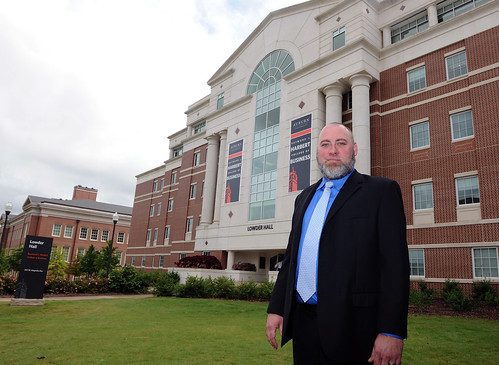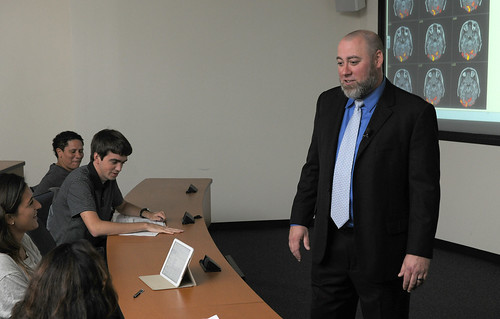Auburn marketing professor using MRI scans to determine if nutritional labeling impacts consumer choices
Article body
Do people really care about fat grams and calories listed on nutritional labels, or has the industry been wasting its time marketing this information? Brian Bourdeau, associate professor of marketing in Auburn University's Raymond J. Harbert College of Business, wants to find out.
"People are eating more salads and things of that nature, but the ultimate question is – why are they doing it?" asked Bourdeau. "Are they doing it because we're telling them they should eat healthy (via advertising)? Or are they doing it because they want to?"
In his ongoing research, "Testing the Efficacy of Mandatory Nutritional Labeling utilizing functional Magnetic Resonance," Bourdeau wants to learn if knowing nutritional content can override the brain's response to food and determine if nutritional labeling and advertising that promotes healthier diets truly impacts consumer decision-making.
But how? Surveys? No. Too much room for error. Bring in the MRI machines.
Volunteers will be subject to non-invasive brain scans at the Samuel Ginn College of Engineering's MRI Research Center which will collect between 500 and 1,500 images. From this, 20 images of the brain's anatomical structure and functions will illustrate changes in the oxygenation (blood flow) from various regions of the brain. Subjects will be shown various food-related images – with or without nutritional information. Results identify consumers' responses to various stimuli by measuring blood flow during the scanning process.
In other words, if the subject sees fat grams associated with a triple cheeseburger and is not turned off – the machine will know it regardless of what the subject actually says in a typical survey.
"There's virtually no error – no chance for the subjects to mislead," Bourdeau said. "What happens is when you have an emotional feeling, a certain part of your brain gets blood flow and that lights up on an MRI. I could ask you feel about calories and fat grams. You could say, 'I don't care. I don't think about it.' However, that's not what's really going on inside your brain.
"We found in prior research with surveys that people tend to over inflate the amount of importance they put on something such as sugar or sodium because they feel that that's what the researcher wants them to say. It doesn't sound as good when they're saying it, but with an MRI machine it's cut and dry."
Bourdeau referenced a proposed ban on "biggie-sized" sugary soft drinks in New York City in 2012 that didn't go over very well.
"A lot of customers were upset and went ahead and bought the biggie sized drinks with high sugar just because they didn't want to be told what they could or couldn't put in their body," Bourdeau noted. "So … how does the nutritional labeling affect people? Does it turn people off? Does it make them angry when they see these things? Probably not, but we just don't know until we get in there and see what's on their minds."
Bourdeau said test subjects will also be given a questionnaire "while they're in the machine" to answer questions pertaining to the procedure.
"The MRI really is a lie detector test," he said. "There is no getting around it or making up answers. I've done tons of survey research and people don't pay close enough attention to the questions they are given or the answers they are giving, they don't care, they Christmas tree the Scan Tron. This way you know for certain what is going on."
How is this information beneficial to the fast food restaurant industry?
"They will know whether or not their efforts have been misguided – if customers are really paying attention to information that's provided on menus or if they're paying attention to advertisements promoting healthier eating or things of that nature," Bourdeau answered. "Ultimately, it might have some significant impact on public policy.
"Ultimately, for the good of everybody, we want people to eat better."
Related Media
Media interested in this story can contact Communications Director Preston Sparks at (334) 844-9999 or preston.sparks@auburn.edu.
Auburn University is a nationally ranked land grant institution recognized for its commitment to world-class scholarship, interdisciplinary research with an elite, top-tier Carnegie R1 classification, life-changing outreach with Carnegie’s Community Engagement designation and an undergraduate education experience second to none. Auburn is home to more than 30,000 students, and its faculty and research partners collaborate to develop and deliver meaningful scholarship, science and technology-based advancements that meet pressing regional, national and global needs. Auburn’s commitment to active student engagement, professional success and public/private partnership drives a growing reputation for outreach and extension that delivers broad economic, health and societal impact.







